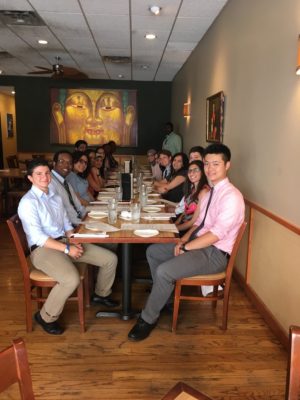
Ryan Kronen in scrubs
The nephrology consult service rotation provides 4th year medical students the opportunity to learn about “all things renal.” Understanding electrolytes, interpreting kidney biopsies, becoming familiar with renal replacement therapies – the students learn by following hospitalized patients with a wide range of kidney disorders, as part of the nephrology consult team, which includes an attending, fellow and a medicine resident.
Medical student Ryan Kronen took his experience one step further. He turned a case of a woman with a rash and an interesting medical history into a scientific case report.
“Clinical Nephrology was my first rotation of the year,” says Ryan. “I had just taken a year off previously to get a Masters Degree in Population Health, so I was getting back into the clinical setting.” Ryan decided on a nephrology elective because he is interested in internal medicine. While Ryan believed that, overall, all the rotations are excellent, he felt that nephrology is relevant on many different levels. “As far as understanding things like fluids, electrolytes, etc., it is really important, and also really complicated as far as managing patients. I learned a lot from the rotation.”
While the month-long consult service schedule is Monday through Friday, it was common for Ryan to come in on weekends to get more “face time”, treating the rotation like a 4th year sub-internship. “It is supposed to be a little more intense than the other rotations, so, I was trying to think of it that way,” says Ryan, “trying to get more involved in it.”
Near the beginning of Ryan’s rotation, the nephrology team was consulted on a young woman who had developed acute kidney injury (AKI) after she underwent her second heart valve surgery in six months. Ryan was assigned to the case and did a thorough history (including extensive chart review), physical examination and assessment and plan. “It was a really interesting case, and it was also really complicated because of her other history,” he says.
The patient had a history of intravenous drug use and had been diagnosed with infective endocarditis, thus necessitating her heart valve surgery. She was started on rifampin for treatment of her endocarditis. A few days into the antibiotic treatment, she developed a rash on her lower extremities and a rise in serum creatinine, consistent with AKI. The nephrology consult team diagnosed the patient with leukocytoclastic vasculitis (based on her rash) and performed a kidney biopsy, which showed evidence of IgA nephropathy.
“Basically, we had been talking about how rifampin can cause this sort of vasculitis, and vasculitis can lead to kidney injury,” says Ryan, recalling his conversations with his attending, Professor of Medicine and Director of Acute Dialysis Services, Dr. Anitha Vijayan. As soon as the patient was switched to a different antibiotic, the rash started improving rapidly, but renal function continued to deteriorate, until she was started on steroids to suppress the inflammation. The patient’s renal function steadily improved after that and she only required two sessions of dialysis.
Searching the literature, Ryan found only a few cases of rifampin-induced vasculitis. “Most of them did not get a kidney biopsy, so they weren’t positive diagnoses, whereas we had the advantage of a kidney biopsy.”
When asked by Dr. Vijayan if he would be interested in writing up a case report on the patient, without hesitation Ryan responded, “Yes, definitely!”
Ryan believes that a case presentation is a perfect publication niche for medical students. “As medical students, especially during the clinical year, we don’t have a lot of opportunities like that to have a relatively quick publication,” he says. “You don’t need to take a year out to do research. You’ve already done the work just by working up the patient. You actually can get it done in a reasonable time!”
The case report, now being prepped for submission, will not be Ryan’s first publication. He is first author on an article just published in The International Journal of Infectious Diseases, the result of work he did with his mentor Dr. Andrej Spec.
Ryan is a former coordinator for the School of Medicine’s LGBT Health Interest Group. On his downtime, he likes to read (mostly modern fiction, some history), watch indie films, and go hiking/camping when time allows. “I also like to eat out … more than I should!”
In the end, Ryan believes that the nephrology consult service gave him an advantage upon entering the rotations that followed. “I am doing the emergency medicine rotation and already I have had patients with hyperkalemia, and I’m like, I know exactly what to do with that! It’s nice to know that I continue to use what I learned.” Ryan hopes to incorporate some sort of public health research as part of his future career.

Ryan Kronen, far left, at the Division of Nephrology consult luncheon.
(See here for the Division of Nephrology’s long-standing tradition used to mark the end of consult rotation for fellows, residents, and medical students.)